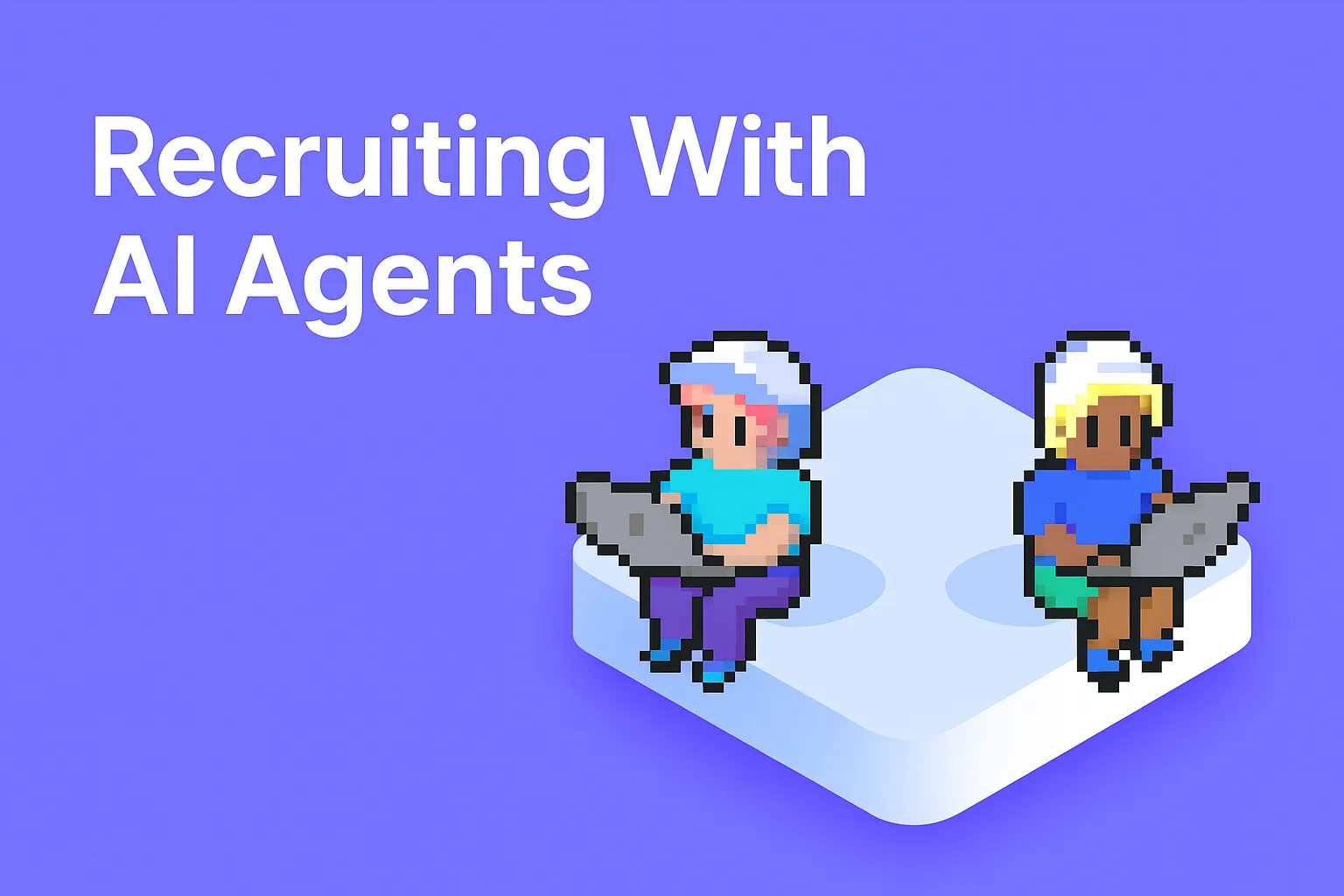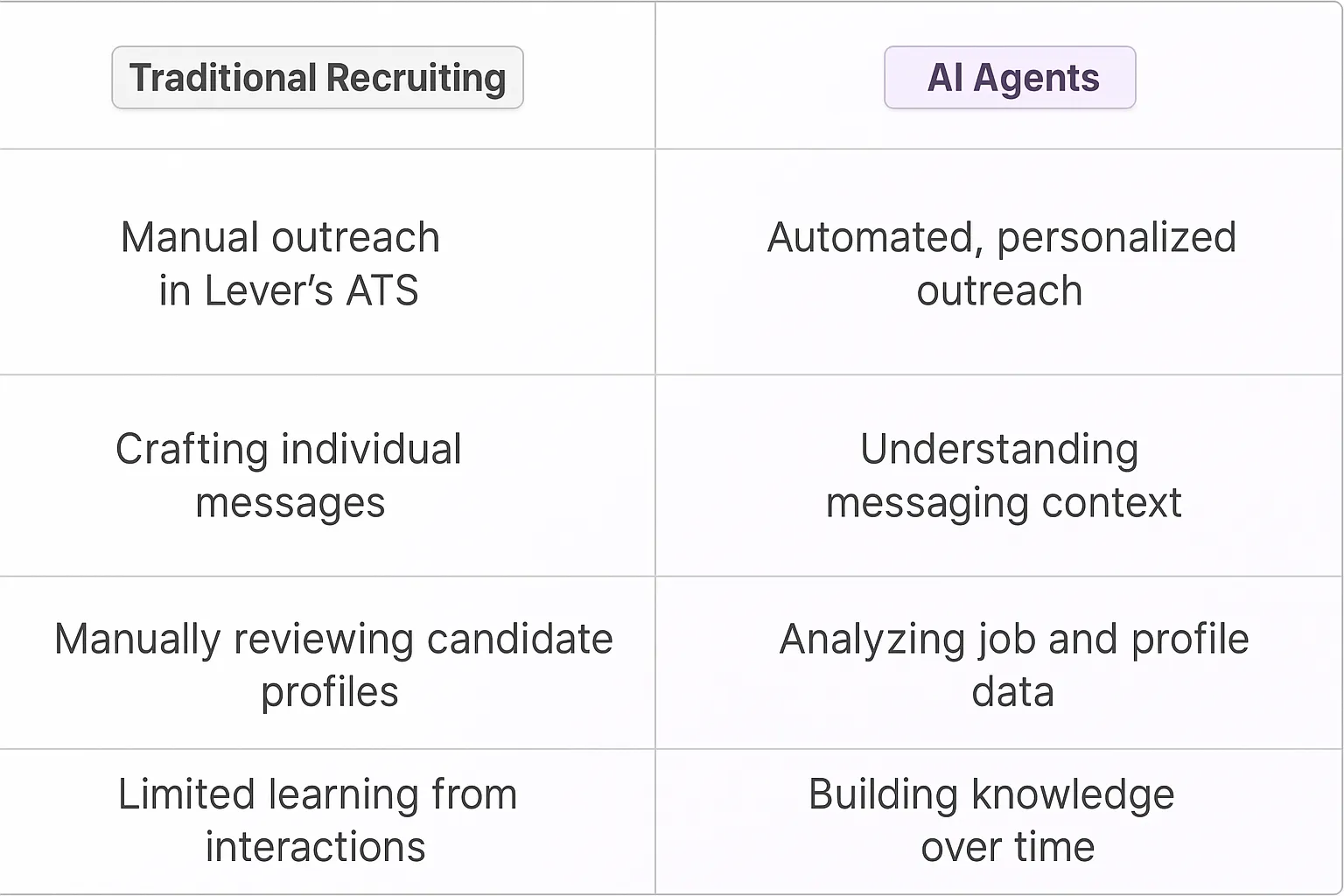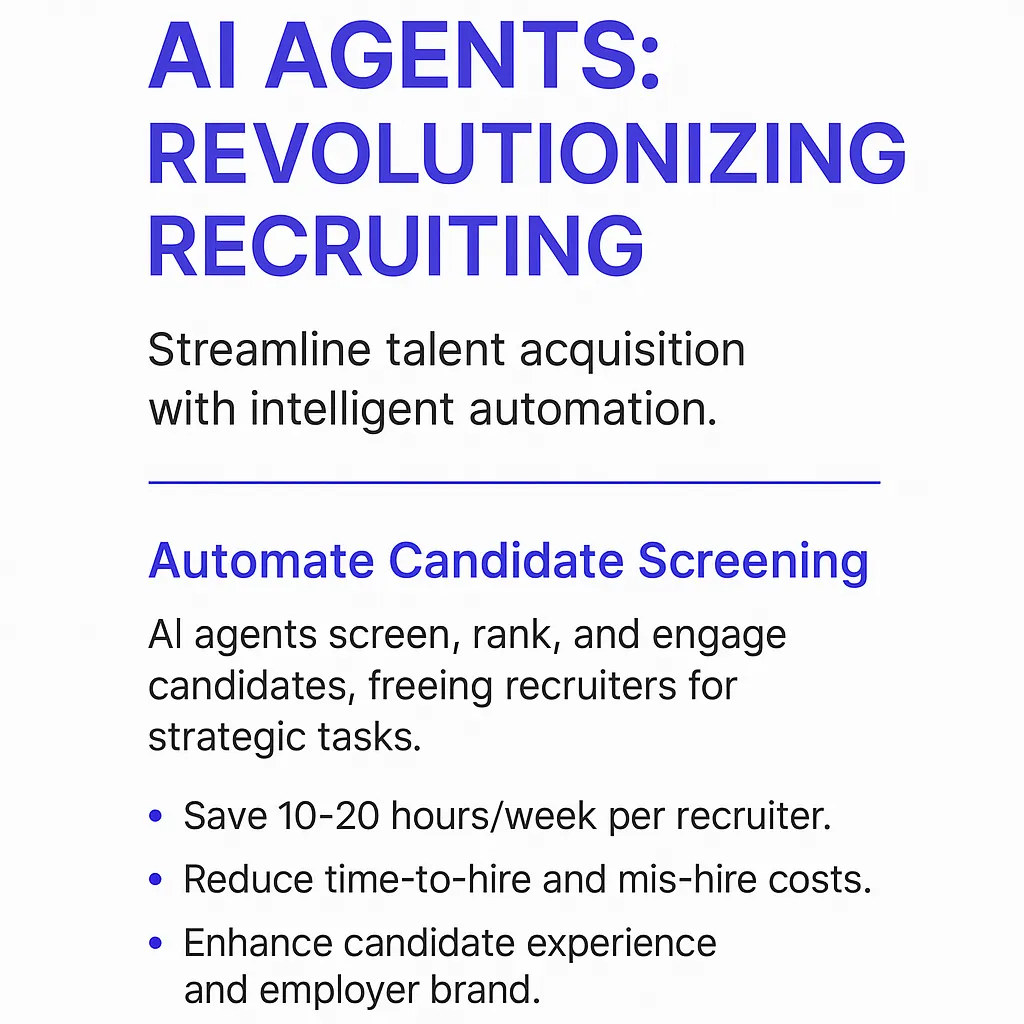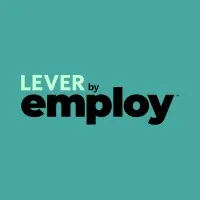Lever
Understanding Lever's AI-Powered Recruiting Platform
What is Lever?
Lever stands as a modern applicant tracking system (ATS) that powers recruiting for organizations ranging from high-growth startups to enterprise companies. The platform combines powerful candidate relationship management capabilities with robust hiring team collaboration tools, creating a comprehensive recruiting solution that scales with organizational needs.
Key Features of Lever
The platform excels in candidate relationship management, offering sophisticated tracking and engagement tools. Its core strengths include customizable hiring workflows, advanced analytics, and seamless integration capabilities. With built-in sourcing and nurture campaigns, Lever enables proactive talent acquisition strategies while maintaining detailed candidate records and communication histories.

Benefits of AI Agents for Lever
What would have been used before AI Agents?
Recruiting teams traditionally relied on manual processes and basic automation tools within Lever's ATS. Sourcers and recruiters spent countless hours writing individual messages, screening resumes, and managing candidate communications. The standard workflow involved toggling between templates, customizing each outreach, and hoping the messaging would resonate with potential candidates.
What are the benefits of AI Agents?
AI Agents transform recruiting workflows in Lever through intelligent automation that actually understands context and nuance. These digital teammates analyze job requirements, candidate profiles, and historical hiring data to craft personalized outreach that feels authentic and relevant.
The network effects are particularly powerful - as AI Agents handle more recruiting interactions, they build pattern recognition around what messaging drives candidate engagement. This creates a compounding advantage where outreach becomes increasingly effective over time.
For talent teams, this means:
- Personalized candidate communications at scale, with AI Agents adapting tone and content based on the role, seniority level, and candidate background
- Intelligent screening that goes beyond keyword matching to understand candidate potential and fit
- Automated interview scheduling and follow-up that maintains a warm, professional tone
- Data-driven insights on messaging effectiveness and candidate engagement patterns
The most compelling aspect is how AI Agents handle end-to-end recruiting coordination while maintaining the human touch that's essential for candidate experience. They're not just executing tasks - they're learning and optimizing based on what works.
This creates a powerful growth loop: better candidate engagement leads to more quality interactions, which improves the AI's understanding, resulting in even more effective recruiting outcomes. It's a classic example of software that gets better with scale.

Potential Use Cases of AI Agents with Lever
Recruiting Process Enhancement
AI Agents transform recruiting workflows in Lever by analyzing candidate profiles, extracting key qualifications, and matching them against job requirements. They scan through application materials to surface the most promising candidates, reducing the time-to-hire metric that often bottlenecks growing companies.
Interview Coordination
The scheduling dance between candidates, hiring managers, and interviewers becomes fluid with AI Agents managing the logistics. These digital teammates handle the back-and-forth of availability checks, send calendar invites, and ensure all participants have the necessary information and meeting links.
Candidate Communication
AI Agents maintain consistent communication threads with candidates, crafting personalized follow-up messages based on their application stage. They generate tailored responses to common candidate queries about job requirements, company culture, and process updates, maintaining engagement throughout the hiring pipeline.
Job Description Optimization
Writing compelling job descriptions that attract top talent is an art form. AI Agents analyze successful past listings and market data to suggest improvements, ensure inclusive language, and optimize for searchability while maintaining the company's unique voice.
Interview Feedback Synthesis
After interviews, AI Agents consolidate feedback from multiple interviewers into structured, actionable summaries. They identify common themes, flag potential concerns, and highlight candidate strengths, enabling faster, more informed hiring decisions.
Onboarding Documentation
Once candidates accept offers, AI Agents generate customized onboarding documentation packages. They pull relevant information from the candidate's profile and job requirements to create tailored welcome materials, reducing manual preparation time for HR teams.
Recruitment Analytics
AI Agents analyze hiring funnel metrics to identify bottlenecks and optimization opportunities. They track key performance indicators like time-to-fill, source effectiveness, and diversity metrics, providing actionable insights to improve recruitment strategies.
Compliance Monitoring
Staying compliant with hiring regulations is crucial. AI Agents monitor job postings and communication for compliance with equal opportunity requirements, ensuring consistent documentation and flagging potential issues before they become problems.

Industry Use Cases
AI agents are transforming how companies use Lever's recruiting platform across multiple sectors. The integration creates a powerful combination of human expertise and AI capabilities that elevates talent acquisition to new heights. From tech startups to enterprise organizations, teams are discovering innovative ways to enhance their recruiting operations through AI-enabled workflows.
The real magic happens when AI agents handle the repetitive aspects of recruiting, giving talent teams more bandwidth to focus on meaningful candidate interactions. This shift represents a fundamental change in how organizations approach hiring - moving from reactive to proactive talent acquisition strategies.
Looking at specific industry applications, we're seeing fascinating patterns emerge in how different sectors leverage these AI capabilities. The technology adapts to unique recruiting challenges while maintaining compliance and delivering consistent results. What makes this particularly compelling is how the AI learns and optimizes based on each organization's hiring patterns and preferences.
Technology Industry: AI Agents Transform Technical Recruiting
The technical recruiting landscape faces a unique challenge - engineering managers and recruiters often speak different languages when it comes to evaluating candidates. While recruiters excel at relationship building and candidate experience, they may struggle with the technical nuances that make a senior software engineer truly exceptional.
Lever AI Agents bridge this gap by acting as specialized technical recruiting partners. When integrated with Lever's ATS, these digital teammates can analyze resumes with deep technical understanding, identifying not just keyword matches but evaluating the complexity and impact of candidates' past projects.
For example, when reviewing a full-stack developer application, the AI Agent distinguishes between someone who simply lists "React" as a skill versus someone who has built scalable applications handling millions of users. It recognizes architectural patterns, system design choices, and technical trade-offs that indicate true engineering expertise.
The AI Agent also crafts technically precise screening questions tailored to each role, whether it's distributed systems engineering or machine learning. This ensures initial candidate evaluations are meaningful and technically rigorous before involving busy engineering managers.
Beyond screening, these digital teammates help compose technically accurate job descriptions that resonate with senior engineers, incorporating specific frameworks, tools, and engineering challenges that attract top talent. They can even suggest compensation ranges based on technical skill combinations that are particularly valuable in the current market.
This technical depth, combined with Lever's existing recruiting workflow, creates a hiring process that respects both the technical and human elements of building engineering teams. The result is faster hiring cycles and better matches between technical talent and engineering organizations.
Healthcare Industry: AI Agents Enhance Clinical Talent Acquisition
The healthcare recruiting ecosystem presents a fascinating complexity - medical institutions must balance clinical excellence, regulatory compliance, and urgent staffing needs while competing for a limited talent pool. Traditional recruiting approaches often buckle under these multifaceted demands.
Lever AI Agents function as specialized healthcare recruiting experts, bringing deep domain knowledge to the talent acquisition process. They parse medical credentials, licensing requirements, and clinical experience with remarkable precision - distinguishing between different specialties, sub-specialties, and the nuanced requirements of various healthcare roles.
When evaluating a cardiovascular nurse practitioner candidate, for instance, the AI Agent analyzes not just basic qualifications but understands the significance of specific certifications, procedural experience, and clinical settings. It recognizes the difference between acute care and primary care experience, evaluating how well the candidate's background aligns with the unit's needs.
The AI Agent's capabilities extend to compliance verification, automatically flagging expired licenses or missing credentials that could impact hiring decisions. For teaching hospitals, it identifies candidates with both clinical expertise and academic experience, understanding the unique requirements of medical education roles.
These digital teammates also excel at crafting role-specific screening protocols. For specialized positions like pediatric oncology nurses or emergency medicine physicians, they generate targeted questions that assess both technical knowledge and essential soft skills like crisis management and family communication.
The integration with Lever's platform creates a recruiting workflow that maintains compliance while moving at the speed healthcare demands. This sophisticated approach to medical recruiting helps healthcare organizations build robust clinical teams while navigating the complex regulatory landscape of medical hiring.
Considerations and Challenges
Implementing AI agents within Lever's recruiting ecosystem requires careful planning and strategic thinking. The integration touches multiple aspects of the hiring workflow and impacts how teams interact with candidates and data.
Technical Challenges
Data privacy stands as a critical concern when deploying AI agents in Lever. Recruiting data contains sensitive candidate information, requiring robust security protocols and compliance with regulations like GDPR and CCPA. The AI agent needs precise access controls to handle confidential salary discussions, interview feedback, and personal candidate details.
Integration complexity also emerges when connecting AI agents with Lever's existing APIs and workflows. Teams need to carefully map data flows between systems while maintaining data integrity across the hiring pipeline. This includes managing potential API rate limits and ensuring consistent data synchronization.
Operational Challenges
Change management becomes crucial as recruiting teams adapt to working alongside AI agents. Recruiters and hiring managers need clear guidelines on when to leverage AI capabilities versus handling interactions personally. This balance affects candidate experience and team productivity.
Training requirements extend beyond just technical setup. Teams need to develop new skills for prompt engineering and understanding AI agent capabilities. This includes learning how to effectively delegate tasks, validate AI outputs, and maintain human oversight of critical hiring decisions.
Strategic Considerations
Measuring ROI requires defining clear success metrics before implementation. Teams should track key indicators like time-to-hire, candidate satisfaction scores, and recruiter productivity. The goal is understanding how AI agents impact both efficiency and effectiveness of hiring processes.
Scaling considerations involve planning for increased AI agent usage across different departments and hiring workflows. This includes managing costs as usage grows and ensuring the system can handle higher volumes of interactions while maintaining performance.
The Future of AI-Enhanced Talent Acquisition
The integration of AI Agents with Lever marks a significant evolution in recruiting technology. By combining intelligent automation with Lever's robust ATS capabilities, organizations gain a competitive edge in talent acquisition. The system's ability to learn and optimize from each interaction creates a compound effect, where recruiting outcomes improve over time. As AI technology continues to advance, this partnership between human recruiters and their digital teammates will likely define the future of talent acquisition.













